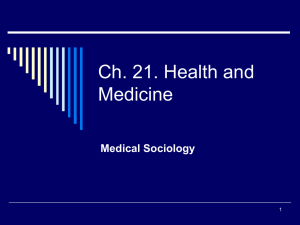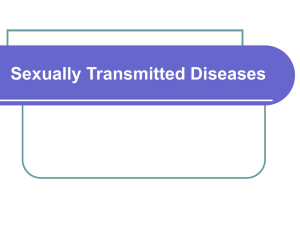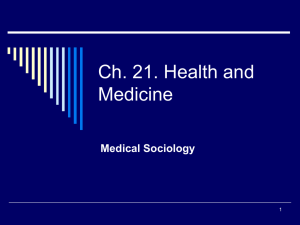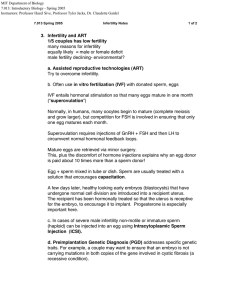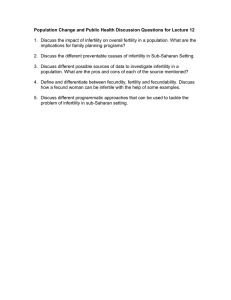Reproductive Technologies, Infertility & STDs - High School Biology
advertisement
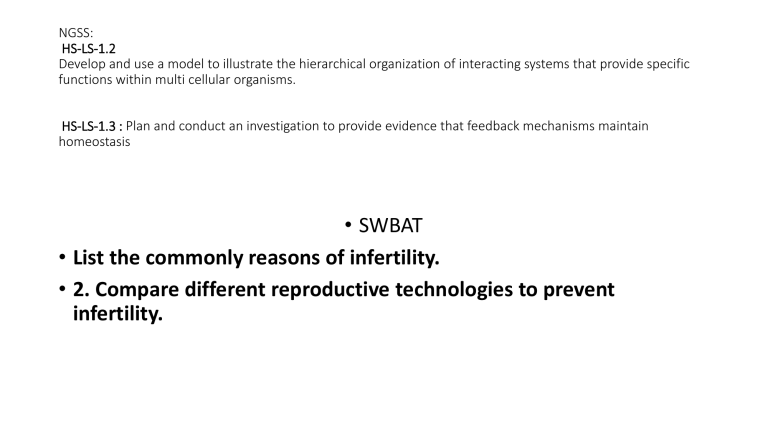
NGSS: HS-LS-1.2 Develop and use a model to illustrate the hierarchical organization of interacting systems that provide specific functions within multi cellular organisms. HS-LS-1.3 : Plan and conduct an investigation to provide evidence that feedback mechanisms maintain homeostasis • SWBAT • List the commonly reasons of infertility. • 2. Compare different reproductive technologies to prevent infertility. Think-Pair-Share • https://www.youtube.com/watch?v=eWhfsiXzmA4 Group Work • Task 1: Discuss AID (Artificial Insemination by Donor )method used to treat infertility and describe ethical issues as well while choosing X or Y chromosome to be fertile. Explain gamete Intrafallopian Transfer (GIFT) • Task2: Summarize steps of IVF and address its benefits/drawbacks. Explain Intracytoplasmic Sperm Injection (ICSI) • Task 3: Compare IVF with that of AID and give your idea based on evidences that which one is better. • Task 4: Explain preimplantation Genetic diagnosis Who can benefit from PGD and address ethical issues. ? • http://americanpregnancy.org/infertility/preimplantation-genetic-diagnosis/ Move around • Clock wise and explain your findings. • Generate challenging questions on given cards while working in groups/pairs. Sum It up and Presentation Of STD’s • Exit Card: • Challenge any one of the group with question you generated earlier to answer all Q/A should be recorded in note books. Control of Human Reproduction • Reproductive Technologies • Infertility • Inability of a couple to achieve pregnancy after one year of regular, unprotected intercourse • May be attributed to the male (40%), the female (40%), or both (20%) • Artificial Insemination by Donor (AID) • In Vitro Fertilization (IVF) • Gamete Intrafallopian Transfer (GIFT) • Surrogate Mothers • Intracytoplasmic Sperm Injection (ICSI) 6 Preimplantation Genetic Diagnosis 8-cell embryo Polar body has genetic defect. Embryonic cell is removed. Oocyte is genetically healthy. egg nucleus sperm nucleus Cell is genetically healthy. Embryo develops normally in uterus. a. Testing the embryo. Embryo develops normally in uterus. b. Testing the oocyte. a, b: © Brand X/SuperStock RF 7 Sexually Transmitted Diseases • AIDS • Human Immunodeficiency Virus (HIV) • Attacks helper T cells • Transmitted by sexual contact • No cure • Genital Warts • Human Papillomaviruses (HPVs) • No cure, but can be treated effectively 8 HIV, the AIDS Virus Copyright © The McGraw-Hill Companies, Inc. Permission required for reproduction or display. © Scott Camazine/Photo Researchers, Inc. 9 Genital Warts 10 Sexually Transmitted Diseases • Genital Herpes • Herpes Simplex Virus • Type I - Cold sores and fever blisters • Type II - Ulcerations on genitals • Viral Hepatitis • A - Sewage-contaminated drinking water • B - Blood transfusions and bodily fluids 11 Genital Herpes 12 Sexually Transmitted Diseases • Bacterial STDs • Chlamydia • Chlamydia trachomatis • Gonorrhea • Neisseria gonorrhoeae • Syphilis • Treponema pallidum 13 Chlamydia Copyright © The McGraw-Hill Companies, Inc. Permission required for reproduction or display. © Biomedical Imaging Unit, Southampton General Hospital, Photo Researchers, Inc. 5000x 14 Gonorrhea 15 Syphilis 16 Sexually Transmitted Diseases • Vaginal Infections • Vaginitis – vaginal inflammation • Gardnerella vaginalis • Candida albicans 17
